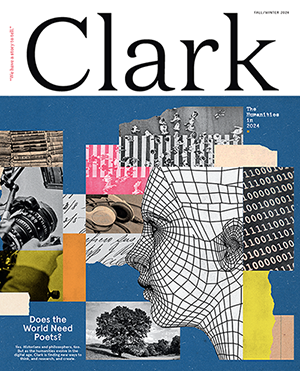Clark University Magazine
Japan’s U.S. Muse

When Hunter Hoysradt ’16 arrived on the Clark campus in 2012, the only clear vision for his future involved a love of Japan—but he was fuzzy on the details.

One thing about which he was certain was his inexhaustible love of Asian culture, dating back to 2006 when he watched an episode of the Anthony Bourdain show “No Reservations” that was shot in Japan. Spending his junior year of high school in Aichi, Japan—with daily language instruction and embedded with a host family—convinced him he would one day work internationally.
“I figured I’d go into Asian studies and political science with a focus on international relations. Other than that, I didn’t really know what I wanted to do,” he recalls.
He figured it out.
For the past three years, Hoysradt has been based in New York City as a news producer for the Japanese broadcasting company Fuji Television, traveling throughout the country to report on a wide range of subjects. He’s covered high-level deliberations at the United Nations, devastating tornadoes in Kentucky, the plight of Florida’s manatees, celebrity arrivals at the Met Gala, and multiple games featuring Major League Baseball sensation Shohei Ohtani. His research, interviews, and project management inform the broadcasts that allow his on-camera counterparts to seamlessly deliver their reports to the viewers back in Japan.
Sometimes he has a week to pull together a story, and sometimes only hours. But he feeds off of the deadline pressures, knowing that the day’s stories are reaching an eager audience. “I’m doing work that is being seen by people in Japan every day,” he marvels.

It was during a film class in his first year at Clark that Hoysradt learned how to write a detailed movie analysis with a deep understanding of atmosphere, direction, and plot. The experience inspired in him an interest in media and journalism in a way he never expected. “I always had a little interest in media, and I knew I was interested in Asia and in going to Japan, so it was here that I began thinking about working in international news.”
After graduating, Hoysradt enrolled in Japan Exchange and Teaching (JET), a program that brings university graduates to Japan as assistant language teachers. “I wanted to live in Japan for a bit, so I taught English as a second language,” he says. “Even though I loved teaching, I knew it wasn’t what I wanted to do long term.” After almost four years of on-and-off teaching, Hoysradt felt a change was in order. It came in the form of a global pandemic, and he found himself back on American soil, buckling down with the rest of the world to ride out COVID-19.
Hoysradt moved in with two Clarkies he’d kept ties with during his time abroad, joining them in Washington, D.C., where he went to work reviewing applications at JET’s U.S. office in the Embassy of Japan. Toward the end of that temporary gig, he learned on a JET Facebook alumni page about an opening for a news producer at Fuji Television’s New York City office. “I thought, ‘Wait, I know international relations. And I know Japan, and what Japanese people are interested in. I’ve taken classes in media and journalism. Maybe I could do this!’”
It turned out that his time at Clark and immersion in Japanese culture had prepared him more than he had anticipated. Hoysradt seized the professional opportunity he’d been seeking.
“I hear people advise you to find a job that you love because that’s where you put all of your time. And I have that job,” he says. “I love being and working in the U.S. but still having a strong tie to Japan.”
In short, he has no reservations.


